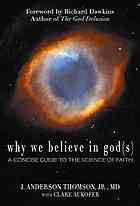
Why We Believe in God(s)
A Concise Guide to the Science of Faith
کتاب های مرتبط
- اطلاعات
- نقد و بررسی
- دیدگاه کاربران
نقد و بررسی

June 15, 2011
A brief look at religion as evolutionary by-product.
Psychiatrist Thomson (Institute of Law, Psychiatry and Public Policy/Univ. of Virginia; Facing Bipolar: The Young Adult's Guide to Dealing with Bipolar Disorder, 2010) takes readers on a very quick tour of evolutionary theory as it relates to religion. His goal is to demonstrate "exactly how and why human minds not only accept the impossible but also have created cults of it." He maintains that a number of psychological features, resulting from human evolution, have come together over the eons to create, perfect and perpetuate supernatural belief systems. Though the argument has its complexities, he writes, "[i]f you understand the psychology of craving fast food...you can fully comprehend the psychology of religion." Just as humans now crave foods that were once hard to find (sugar, salt, fats), they also now crave a caretaker, as well as the sense of social belonging and order brought about through religion. But, Thomson cautions, too much of what we crave can be bad for us. While the author is not overtly anti-religious, he does make it clear that he believes religion in modern society is, on the whole, an impediment to humanity. What readers will not be able to ignore, however, is the contradiction Thomson poses to his own argument. He falls into the exact evolutionary trap he has described—of having to believe in something—with his idolization of evolutionary biologist Charles Darwin. He speaks uncritically of Darwin at every turn, begins each chapter with a Darwin quote that he pairs with a scriptural or otherwise religious phrase and speaks of him in such admiring prose that readers will come to see Darwin as the author's own saint or deliverer.
Mildly thought-provoking but unconvincing.
(COPYRIGHT (2011) KIRKUS REVIEWS/NIELSEN BUSINESS MEDIA, INC. ALL RIGHTS RESERVED.)

May 1, 2011
A trustee of the Richard Dawkins Foundation for Reason and Science, Thomson (staff psychiatrist, Student Health Svcs., Univ. of Virginia) is a rising figure in what has come to be called the "New Atheism," best represented by the popular writings of Dawkins, Christopher Hitchens, and Daniel Dennett. Here, with the assistance of Aukofer, he argues, in the main, that our religious beliefs stem from evolutionary cognitive neuroscience--that is, that the human mind has created God, rather than the other way about. While there is room for discussion of Thomson's point, this brief and careless book, which mixes studies of differing types, isolated examples, assertion, generalization, and anecdote, is unlikely to win new converts to unfaith. VERDICT Likely to be entertaining and comforting to readers already convinced in their atheism but unlikely to sway others. For a real albeit limited audience. With a foreword by Dawkins.
Copyright 2011 Library Journal, LLC Used with permission.

June 1, 2011
The big ideas of this book (not counting religion) are evolution and the human brain. Thomson, a psychiatrist, maintains that focus as he explores several components of religion to which humans are especially drawn. Why? Because he believes our brains are wired that waynot by divine intervention, but by evolutionary growth. In fact, one of the first chapters serves as an Evolution 101 overview. Not surprisingly, Thomson's most frequent dialogue partner is Darwin, whose quotes introduce every chapter. Most explore a particular angle in an attempt to answer the questions of how and why the human brain generates religious beliefs. Why, for example, do we long for attachment to othersthe kind people enjoy in religious communities? Why are we predisposed to believe in things or beings we can't see or touch? Why are we drawn to rituals? Thomson provides nontechnical answers to such questions by exploring human survival instincts, the brain's pleasure-based chemicals, and even basic psychology. A small (almost pocket-size) book with enough information to pique the interest of believers and nonbelievers alike.(Reprinted with permission of Booklist, copyright 2011, American Library Association.)

























دیدگاه کاربران